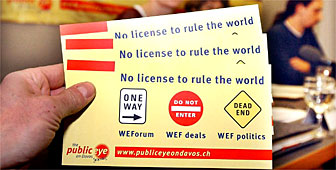Greenpeace to boycott WEF meeting

Greenpeace will not attend this year's World Economic Forum summit in New York, dealing a blow to the WEF's efforts to shed its elitist image.
The environmental organisation told Swiss radio on Wednesday that it had torn up its invitation because it saw no point in attending the annual gathering of the world’s political and business elite.
Kaspar Schuler, head of Greenpeace Switzerland, said talks with the automobile industry at the WEF’s previous two meetings in the Swiss resort of Davos had yielded nothing.
Greenpeace’s decision comes as the WEF has been trying to appear more open amid charges that it is little more than a club for the rich and powerful.
That impression has been reinforced in recent years by media images of protesters battling police in the streets while political and business leaders sit behind cordons in the alpine resort of Davos – the traditional home of the WEF summit.
Greenpeace announced its decision as Swiss non-governmental organisations (NGOs) said they would take aim at multinationals at this year’s summit, which is being held in New York for the first time.
Public Eye on Davos
The Public Eye on Davos brings together critics of the WEF in a parallel conference that is open to the public in New York.
Beginning January 31, under the slogan “No License to rule the World”, the Public Eye will call for an international convention requiring multinationals to abide by environmental and social standards. Like the WEF, the conference ends February 3.
The Berne Declaration and Pro Natura, two Swiss NGO’s, plan to send representatives to the Public Eye conference, which will be held in Manhattan just a few blocks from the WEF.
Applying standards
Christine Eberlein of the Berne Declaration said the primary target of the Public Eye conference would be multinational companies.
“We want these companies to have common social and environmental standards,” Eberlein told swissinfo, “Our main objective is to lobby for a change in this field, so that big businesses have to abide by the standards which, for example, apply in their home countries.”
Many environmental groups like Pro Natura are concerned that multinationals are not applying the environmental standards they must obey at home when they invest in developing countries.
There is also concern that some companies are exploiting workers in developing countries by paying low wages.
“The policies of these large corporations can damage the environment,” Pro Natura’s Miriam Behrens told swissinfo, “What we want is an international convention to make companies abide by high environmental standards.”
“The same goes for social standards,” Behrens added.
United Nations support
Pro Natura believes the UN would be the right body to introduce and implement a new convention on environmental and social standards, and will use the Public Eye conference to launch a campaign calling for UN involvement.
“We want the UN to lead the way in this matter,” said Behrens. “And we want the new convention to have the power to impose sanctions on companies which don’t abide by the standards set out in the convention.
Such a convention, if it is ever to come about, will need at least some support from WEF members as well, but while Pro Natura’s international parent group, Friends of the Earth, will have two delegates at the WEF itself, the Berne Declaration currently rejects dialogue with WEF organisers.
Public relations
“We decided we don’t want open dialogue with them yet,” said Christine Eberlein. “Klaus Schwab (WEF president) is interested in public relations, but not in making any genuine commitments.”
“We don’t want to be used in a public relations exercise, so unless he agrees to take part in a common forum with us, outside the WEF, we don’t really want to participate in talks with him.”
New York’s advantages
One positive aspect of this year’s forum, according to the non-governmental organisations, is the fact that the venue of New York will make alternative discussions and even demonstrations much easier.
The New York authorities have in fact already agreed to an official anti WEF demonstration, which will take place in Manhattan on February 2.
“New York will be very different from Davos,” said Eberlein. “In Davos the authorities never really tolerated official demonstrations, but in New York we will have one, and there will be all sorts of other street activities as well.”
Eberlein, however, said the Berne Declaration had not yet decided whether to participate in the official demonstration.
“We need some reassurance that it will be a peaceful event,” she explained. “We are a non-violent organisation and we won’t take part in demonstrations where violence is intended.”
WEF 2003
Of course, the big question that has yet to be answered is where the WEF will be held next year. Klaus Schwab and his colleagues have said they might like to return to Davos, but would also consider other venues.
For WEF critics, though, the venue is not really important. Instead, organisations like the Berne Declaration say they will continue to focus on the issues.
“To be honest we don’t really care where the WEF is held,” explained Eberlein. “What is important is that it becomes more democratic. We will continue to fight for a transparent public forum where important issues are discussed.”
“What we don’t want is an isolated, island WEF, which becomes a secret club.”
By Imogen Foulkes

In compliance with the JTI standards
More: SWI swissinfo.ch certified by the Journalism Trust Initiative
You can find an overview of ongoing debates with our journalists here . Please join us!
If you want to start a conversation about a topic raised in this article or want to report factual errors, email us at english@swissinfo.ch.